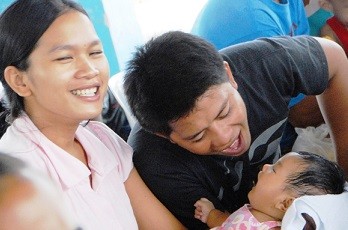
While the Philippine economy has grown at an average annual rate of 7 percent from 2011-2013, 42 percent of the population remains below the international poverty line of $2 per day. And while the Philippine economy is demonstrating some resiliency, key binding constraints to growth, led by weak governance, constrained public finance, lack of infrastructure, and weak human capacity continue to hinder inclusive growth and broad-based development.
In November 2011, the Government of the Republic of the Philippines (GPH) and the United States Government (USG) launched the Partnership for Growth (PFG), a joint effort to address the binding constraints to economic growth and development in the Philippines. Established by President Obama, the PFG is a “whole-of-government” effort that fosters accelerated growth needed for lower income countries to become the next generation of emerging markets.
A substantial part of USAID’s development programming in the Philippines—one of only four PFG countries globally-- addresses the four binding constraints to growth. This fact sheet describes USAID’s programs that address strengthening human capital and productivity through health improvements.
THE PHILIPPINES’ HEALTH CONTEXT
The Philippines is challenged by high rates of maternal and neonatal mortality and a high incidence of tuberculosis (TB). The annual population growth rate, estimated at 1.9 percent in 2010, remains one of the highest in Southeast Asia. At the same time, the documented gap between actual total fertility (3.0 children per woman) versus desired fertility (2.2 children per woman) signals a significant unmet need for family planning (FP) information, commodities and services.
USAID’s assistance enhances the capacity of the Philippines’ Department of Health (DOH), local government units (provinces, municipalities and cities), and the private sector to provide quality health services. All USAID activities support the Philippine Government’s Universal Health Care agenda and are implemented through a bilateral assistance agreement with the DOH. USAID-supported programs focus on strengthening health systems while increasing the demand for and access to maternal, neonatal, and child health (MNCH), FP services and TB control.
APPROACHES
Improving the Supply of Integrated Family Health Services
USAID works to increase the availability and accessibility of quality MNCH and FP services by helping the public sector become more efficient and effective. Simultaneously, it seeks opportunities to strengthen the quality of care offered by private sector providers and draw them into an expanded primary care role. USAID focuses on the strategic integration of family planning with MNCH services, scaling up internationally accepted best practices, and helping the DOH roll out its policies and programs to key underserved areas. USAID supports the introduction of a wider range of FP methods to women of reproductive age to reduce the unmet need for FP. USAID will continue to support the scale-up of access to quality Directly Observed Treatment, Short-course (DOTS) services for TB and improve programmatic management of drug-resistant TB to expand treatment for TB patients in both public and private sectors. A major strategy is to establish or expand service delivery networks to improve cross-referrals between private practitioners, pharmacies and the public sector to strengthen participation in MNCH, FP, and TB control.
Developing Healthy Behaviors and Practices
Communication plays an integral part in an effective response to health challenges. USAID works with health officials and health service providers to inform the public and educate individuals about appropriate health practices, signs and symptoms of common family health issues, and availability of services. USAID utilizes multi-media approaches to reach the largest number of target audiences with appropriate health messages using evidence-based communication campaigns. It mobilizes local NGOs and other sectors to generate communities’ demand for health information and services.
Improving Health Policies and Systems
The Philippine government has established national policies on MNCH, and nutrition, as well as a government strategy and action plan to address TB. USAID works to ensure that national-level strategies and policies are effectively developed with local input and disseminated to communities for implementation. USAID supports the elimination of policy barriers to the supply and demand of family health services. An important focus of USAID’s policy reform work is on securing long-term, sustainable financing for the health sector at both the national and local government levels, and at building the capacity of local governments for health planning, financing, program implementation, monitoring and evaluation, and managing the availability of key products and commodities for FP, TB and MNCH programs.








Comment
Make a general inquiry or suggest an improvement.